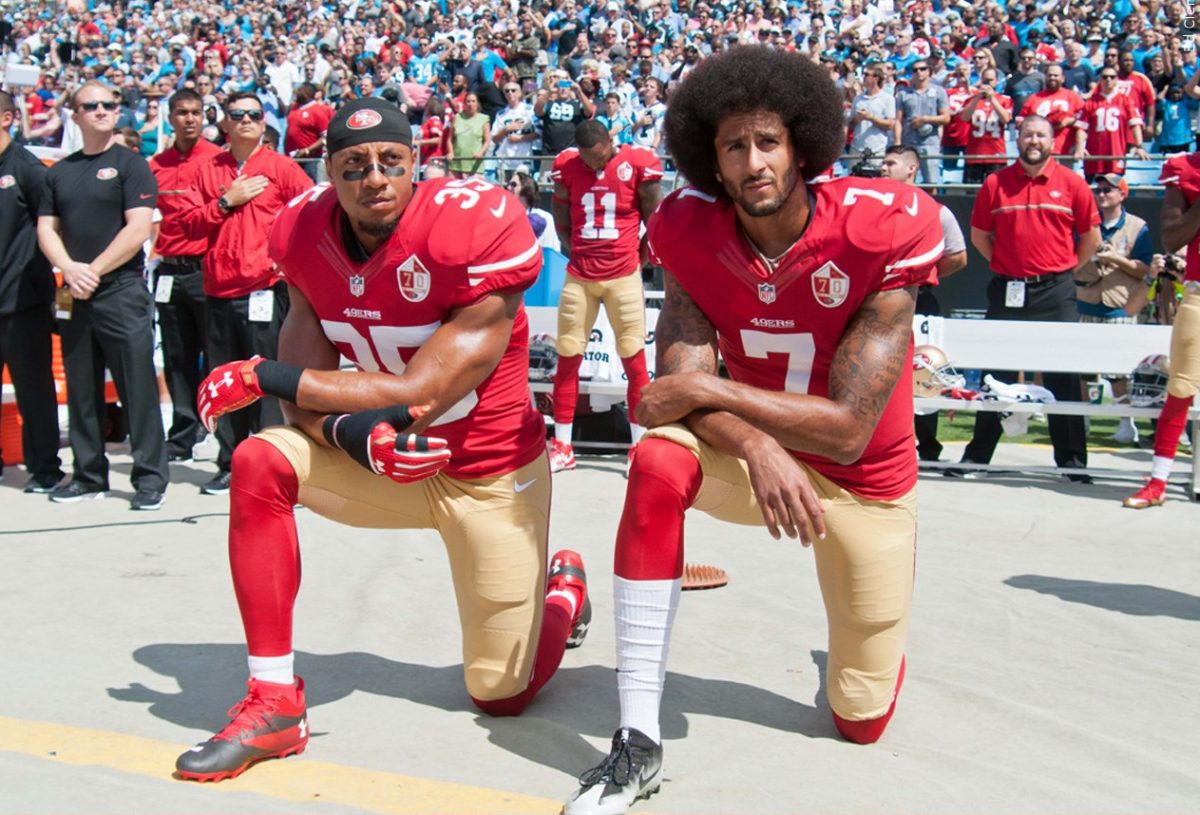For many, the world of sports can be a place to escape from the heated political climate that society currently faces. However, politics and social issues often find themselves at the forefront of sports media.
Over the years, many athletes and coaches have unapologetically shared their views on certain issues in interviews with the press and on social media.
Perhaps most notably, former San Francisco 49ers quarterback Colin Kaepernick caused quite a stir in the NFL after taking a knee during the national anthem that is played prior to games during the 2016 preseason. Kaepernick commented on social media and sat out during the national anthem in protest of police brutality, specifically the police killings of Alton Sterling, Philando Castille, Charles Kinsey and Freddy Gray.
Kaepernick’s protest saw harsh backlash from many NFL fans and players, many of whom claimed that he was disrespecting the United States armed forces and that politics had no place in the NFL.
However, Kaepernick’s actions seemed to spark lots of social and political conversation among many athletes and those who follow sports. According to Sports Illustrated, more than 40 players followed Kaepernick in protesting the national anthem in some form that season.
It seems that athletes and coaches become more comfortable sharing their political opinions in recent memory.
NBA superstar LeBron James is one of many athletes who have spoken up on certain issues. He has previously used his platform to encourage others to vote, donning a shirt that read “VOTE OR DIE!” during a Los Angeles Lakers practice in 2020. He has also been very critical of president-elect Donald Trump, and he publicly endorsed President Joe Biden in the 2020 presidential election.
Some sports fans are very receptive to athletes’ opinions, praising them for using their platforms to contribute to political discussions. Others have adopted a “shut up and dribble” mentality, being critical of outspokenness on sensitive subjects such as police brutality, elections and trans-inclusionary athletics.
“I don’t have a problem with athletes saying their opinions on social media because that’s a personal account,” said Dylan Lewis, a senior marketing major. “But I don’t really like when they say things during game interviews because then it feels like it’s overshadowing the game.”
With an election taking place during the NFL and NBA seasons, players had plenty of chances to make comments and give endorsements, and many of them took advantage of that.
In a recent post-game interview being given to his teammates, 49ers defensive end Nick Bosa walked behind them and pointed to his hat, which read “Make America Great Again,” a famous slogan for Trump’s 2016, 2020 and 2024 presidential campaigns. Roughly eight years following Kaepernick’s protest, another 49ers player had brought backlash against the team for a public display of opinion.
Bosa declined to comment on the situation in his media availability after the game.
Professional athletes were not the only ones in the world of sports to endorse candidates in uniform.
After scoring an exciting touchdown on a fake field goal, Texas Tech football kicker Reese Burkhardt lifted up his jersey to reveal “Trump 24” and “MAGA” written on a white shirt.
“I honestly couldn’t care less if an athlete talks about politics,” said Cole Lazich, a senior management information systems major. “If anybody else can talk about politics at their job, then they should be allowed to too. The only difference is that a lot of them have a camera in their face.”
It does not seem like athletes dedicated to social and political change have any intentions of becoming silent.


